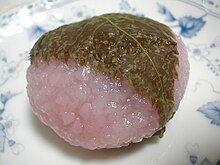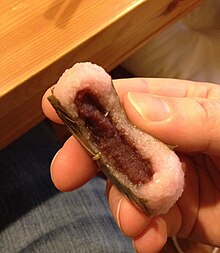This article needs additional citations for verification. (February 2018) |
Sakuramochi (桜餅) is a Japanese confection (wagashi) consisting of sweet, pink-colored rice cake (mochi) with red bean paste (anko) filling, wrapped in a pickled cherry blossom (sakura) leaf, which may or may not be eaten depending on individual preference.
 Sakuramochi (Kanto-style) | |
| Place of origin | Japan |
|---|---|
| Main ingredients | Sweet pink-colored rice cake, red bean paste, pickled cherry blossom leaf |
| Other information | Traditionally consumed on Hinamatsuri and at Hanami |

Traditionally, the sweet is eaten during the spring season,[1][2] especially at the annual Hinamatsuri celebration on March 3 and flower viewing (hanami) parties.[3][4][5]

History
editThe invention of sakuramochi is traditionally attributed to the Mukōjima neighborhood of Edo (today Tokyo) in the second year of the Kyōhō era (1717 AD),[6][7] when Shinroku Yamamoto,[8] who had worked as a gatekeeper at Chōmei-ji Temple[2] since 1691, established a teahouse named Yamamoto-ya in front of the temple.
Originally meant for those visiting their family graves in the Chōmei-ji cemetery, the sweet was wrapped in cherry blossom leaves Yamamoto collected while cleaning up the temple grounds.[9] The sweet grew popular among the crowds of hanami-goers, many of whom were attracted by the cherry blossom trees planted along the Sumida River by the order of the shōgun Tokugawa Yoshimune.
Yamamoto-ya remains in business to this day and is often simply referred to as Chōmeiji. Available all year, its sakuramochi is made from wheat flour, adzuki from Hokkaido, and Oshima cherry leaves from Matsuzaki, Shizuoka, using a recipe largely unchanged since the Edo period.
Types
editThere are two major types of sakuramochi: Chōmeiji and Dōmyōji.[4][8] Though their origins are regional, both types are often available at wagashi shops and supermarkets.
- Kanto style
- Sakuramochi common in the Kantō region, particularly in Tokyo, also known as Chōmeiji-mochi. This type is a kind of crêpe made from shiratama-ko (glutinous rice flour), though the original sakuramochi at Chōmeiji Yamamoto-ya uses wheat flour.
- Kansai style
- Sakuramochi common in the Kansai region, also referred to as Dōmyōji-mochi after the Buddhist temple in Osaka where its nuns made the famous Dōmyōji-hoshii (dried glutinous rice). It is somewhat similar to ohagi.
See also
edit- Sakurayu
- Sakura cheese
- Hwajeon
- Japanese tea ceremony
- Wajik
- Kashiwa mochi
- Hanabiramochi
- Hishi mochi
- Warabimochi
- Zunda-mochi
- Kuzumochi
- Kusa mochi
- Hyōroku mochi
- Botamochi
- Kusamochi
References
edit- ^ "Sakuramochi (pink-colored rice cake filled with red bean paste wrapped with a cherry blossom leaf)". Our Regional Cuisines. Retrieved 2024-04-01.
- ^ a b Publication, Takayuki Nakao / Special to Ryoko Yomiuri (2023-03-14). "Japan Tourism / Sakura Mochi Heralds the Coming of Spring". japannews.yomiuri.co.jp. Retrieved 2024-04-01.
- ^ "Only In Spring! Seasonal Japanese Desserts You Should Try". favy. Archived from the original on 4 April 2017.
- ^ a b Sui, Hadley (June 14, 2022). Oishisou!! The Ultimate Anime Dessert Cookbook. Illustrated by Monique Narboneta Zosa. Insight Editions. ISBN 9781647225681.
- ^ Kirker, Constance L.; Newman, Mary (March 16, 2021). Cherry. Reaktion Books. p. 73. ISBN 9781789142839.
- ^ "TOPページ|長命寺櫻もち". sakura-mochi.com. Retrieved 2023-09-29.
- ^ "Sakuramochi: A Spring Delicacy | April 2021 | Highlighting Japan". www.gov-online.go.jp. Retrieved 2024-04-01.
- ^ a b "Sakuramochi | Traditional Dessert From Tokyo | TasteAtlas". www.tasteatlas.com. Retrieved 2024-04-01.
- ^ Publication, Takayuki Nakao / Special to Ryoko Yomiuri (2023-03-14). "Japan Tourism / Sakura Mochi Heralds the Coming of Spring". japannews.yomiuri.co.jp. Retrieved 2024-04-01.